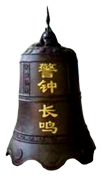|
张培华
张培华, 天津市人。 我班三位女歌唱家之一, 曾任我班文娱委员,经常与谷启楠朱柏桐一起教大家唱新歌。 毕业后分配到山西农学院,后调到山西大学任教授。
  

张培华于1965

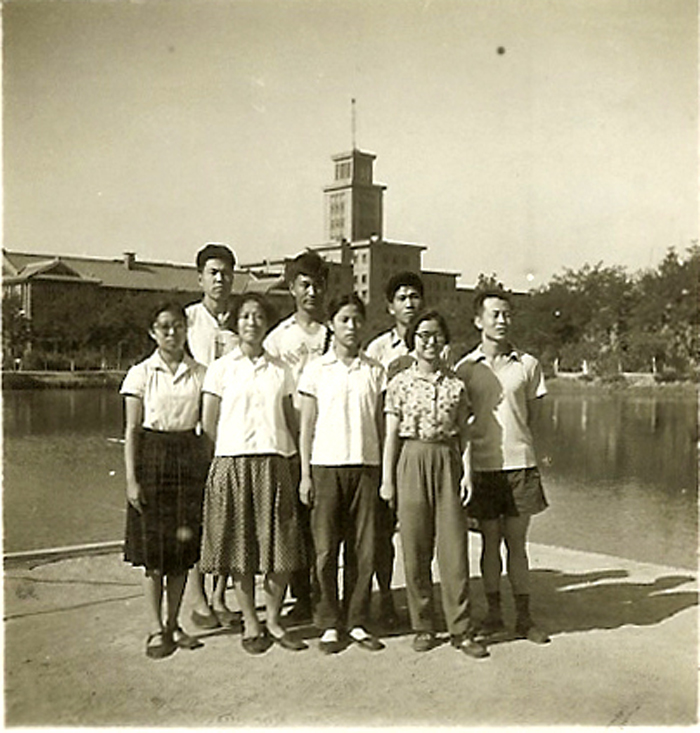
毕业照前排左一为张培华 1965
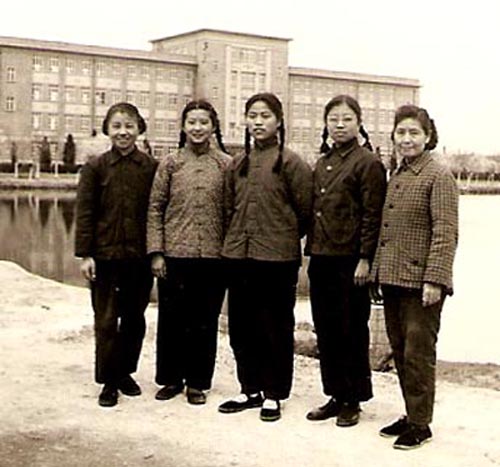
左起总支书记吕玉池与60级同学谷启楠、王蕴茹、张培华和李宜燮教授夫人殷辉先生,early 1960s.

前排左起张连泰、吴则田、刘焕群;二排左起吕玉池团总支书记、王蕴茹、张培华、殷辉老师;三排左起宮自强、朱文俊、刘士聪、金隄老师、佟学龄。

在一次学术会议上,张培华与前排的1965届同班同学刘焕群交谈。
  
|
American Poet William Cullen Bryant (1794-1878) |
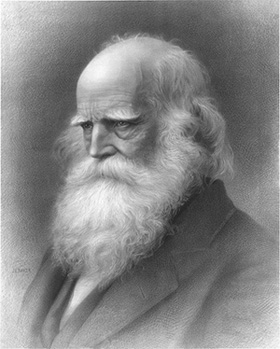
W.C. Bryant, c1876
(This work of art is in the public domain.)
William Cullen Bryant (November 3, 1794 - June 12, 1878) was an American romantic poet, journalist, and long-time editor of the New York Evening Post. Bryant was born on November 3, 1794, in a log cabin near Cummington, Massachusetts. He was the second son of Peter Bryant, a doctor and later a state legislator, Bryant developed an interest in poetry early in life. Under his father's tutelage, he emulated Alexander Pope and other Neo-Classic British poets. The Embargo, a savage attack on President Thomas Jefferson published in 1808, reflected Dr. Bryant's Federalist political views, a second, expanded edition included Bryant's translation of Classical verse, was printed. The youth wrote little poetry while preparing to enter Williams College as a sophomore, but upon leaving Williams after a single year and then beginning to read law, he regenerated his passion for poetry through encounter with the English pre-Romantics and, particularly, William Wordsworth.
In 1884, New York City's Reservoir Square, at the intersection of 42nd Street and Sixth Avenue, next to New York Public Library, was renamed Bryant Park in his honor. The city later named a public high school in Long Island City, Queens in his honor, the William Cullen Bryant High School, or Bryant High School for short..
 
June
by William Cullen Bryant |
|
| |
I gazed upon the glorious sky
And the green mountains round,
And thought that when I came to lie
At rest within the ground,
"Twere pleasant, that in flowery June,
When brooks send up a cheerful tune,
And groves a joyous sound,
The sexton's hand, my grave to make,
The rich, green mountain-turf should break.
A cell within the frozen mould,
A coffin borne through sleet,
And icy clods above it rolled,
While fierce the tempests beat--
Away!--I will not think of these--
Blue be the sky and soft the breeze,
Earth green beneath the feet,
And be the damp mould gently pressed
Into my narrow place of rest.
There through the long, long summer hours,
The golden light should lie,
And thick young herbs and groups of flowers
Stand in their beauty by.
The oriole should build and tell
His love-tale close beside my cell;
The idle butterfly
Should rest him there, and there be heard
The housewife bee and humming-bird.
And what if cheerful shouts at noon
Come, from the village sent,
Or songs of maids, beneath the moon
With fairy laughter blent?
And what if, in the evening light,
Betrothed lovers walk in sight
Of my low monument?
I would the lovely scene around
Might know no sadder sight nor sound.
I know that I no more should see
The season's glorious show,
Nor would its brightness shine for me,
Nor its wild music flow;
But if, around my place of sleep,
The friends I love should come to weep,
They might not haste to go.
Soft airs, and song, and light, and bloom
Should keep them lingering by my tomb.
These to their softened hearts should bear
The thought of what has been,
And speak of one who cannot share
The gladness of the scene;
Whose part, in all the pomp that fills
The circuit of the summer hills,
Is that his grave is green;
And deeply would their hearts rejoice
To hear again his living voice. |
|
| |
To a Waterfowl
by William Cullen Bryant |
|
| |
Whither, midst falling dew,
While glow the heavens with the last steps of day
Far, through their rosy depths, dost thou pursue
Thy solitary way?
Vainly the fowler's eye
Might mark thy distant flight to do thee wrong
As, darkly seen against the crimson sky,
Thy figure floats along.
Seek'st thou the plashy brink
Of weedy lake, or marge of river wide,
Or where the rocking billows rise and sing
On the chafed ocean side?
There is a Power whose care
Teaches thy way along that pathless coast--
The desert and illimitable air--
Lone wandering, but not lost.
All day thy wings have fanned,
At that far height, the cold, thin atmosphere,
Yet stoop not, weary, to the welcome land,
Though the dark night is near.
And soon that toil shall end;
Soon shalt thou find a summer home, and rest,
And scream among thy fellows; reeds shall bend,
Soon, o'er thy sheltered nest.
Thou'rt gone, the abyss of heaven
Hath swallowed up thy form; yet, on my heart
Deeply has sunk the lesson thou hast given,
And shall not soon depart.
He who, from zone to zone,
Guides through the boundless sky thy certain flight,
In the long way that I must tread alone,
Will lead my steps aright.
|
|
Thanatopsis
by William Cullen Bryant |
|
| |
To him who in the love of nature holds
Communion with her visible forms, she speaks
A various language; for his gayer hours
She has a voice of gladness, and a smile
And eloquence of beauty; and she glides
Into his darker musings, with a mild
And healing sympathy that steals away
Their sharpness ere he is aware. When thoughts
Of the last bitter hour come like a blight
Over thy spirit, and sad images
Of the stern agony, and shroud, and pall,
And breathless darkness, and the narrow house,
Make thee to shudder, and grow sick at heart;--
Go forth, under the open sky, and list
To Nature's teachings, while from all around--
Earth and her waters, and the depths of air--
Comes a still voice. Yet a few days, and thee
The all-beholding sun shall see no more
In all his course; nor yet in the cold ground,
Where thy pale form was laid, with many tears,
Nor in the embrace of ocean, shall exist
Thy image. Earth, that nourished thee, shall claim
Thy growth, to be resolved to earth again,
And, lost each human trace, surrendering up
Thine individual being, shalt thou go
To mix forever with the elements,
To be a brother to the insensible rock
And to the sluggish clod, which the rude swain
Turns with his share, and treads upon. The oak
Shall send his roots abroad, and pierce thy mold.
Yet not to thine eternal resting-place
Shalt thou retire alone, nor couldst thou wish
Couch more magnificent. Thou shalt lie down
With patriarchs of the infant world -- with kings,
The powerful of the earth -- the wise, the good,
Fair forms, and hoary seers of ages past,
All in one mighty sepulchre. The hills
Rock-ribbed and ancient as the sun, -- the vales
Stretching in pensive quietness between;
The venerable woods -- rivers that move
In majesty, and the complaining brooks
That make the meadows green; and, poured round all,
Old Ocean's gray and melancholy waste,--
Are but the solemn decorations all
Of the great tomb of man. The golden sun,
The planets, all the infinite host of heaven,
Are shining on the sad abodes of death
Through the still lapse of ages. All that tread
The globe are but a handful to the tribes
That slumber in its bosom. -- Take the wings
Of morning, pierce the Barcan wilderness,
Or lose thyself in the continuous woods
Where rolls the Oregon, and hears no sound,
Save his own dashings -- yet the dead are there:
And millions in those solitudes, since first
The flight of years began, have laid them down
In their last sleep -- the dead reign there alone.
So shalt thou rest -- and what if thou withdraw
In silence from the living, and no friend
Take note of thy departure? All that breathe
Will share thy destiny. The gay will laugh
When thou art gone, the solemn brood of care
Plod on, and each one as before will chase
His favorite phantom; yet all these shall leave
Their mirth and their employments, and shall come
And make their bed with thee. As the long train
Of ages glides away, the sons of men--
The youth in life's fresh spring, and he who goes
In the full strength of years, matron and maid,
The speechless babe, and the gray-headed man--
Shall one by one be gathered to thy side,
By those, who in their turn, shall follow them.
So live, that when thy summons comes to join
The innumerable caravan, which moves
To that mysterious realm, where each shall take
His chamber in the silent halls of death,
Thou go not, like the quarry-slave at night,
Scourged to his dungeon, but, sustained and soothed
By an unfaltering trust, approach thy grave
Like one who wraps the drapery of his couch
About him, and lies down to pleasant dreams. |
|
October
by William Cullen Bryant |
|
| |
Ay, thou art welcome, heaven's delicious breath!
When woods begin to wear the crimson leaf,
And suns grow meek, and the meek suns grow brief
And the year smiles as it draws near its death.
Wind of the sunny south! oh, still delay
In the gay woods and in the golden air,
Like to a good old age released from care,
Journeying, in long serenity, away.
In such a bright, late quiet, would that I
Might wear out life like thee, 'mid bowers and brooks
And dearer yet, the sunshine of kind looks,
And music of kind voices ever nigh;
And when my last sand twinkled in the glass ,
Pass silently from men, as thou dost pass. |
|
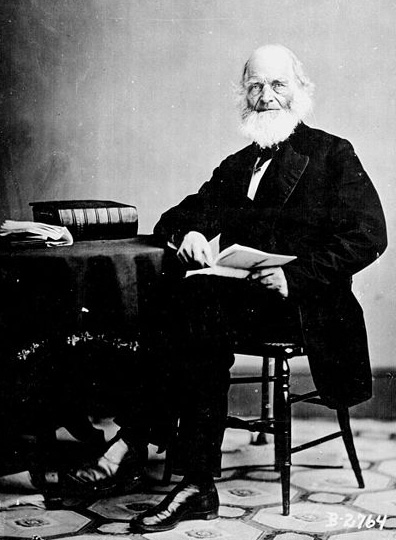
Photograph of Bryant by Mathew Brady, c. 1860–65
(This photo is in the public domain.)
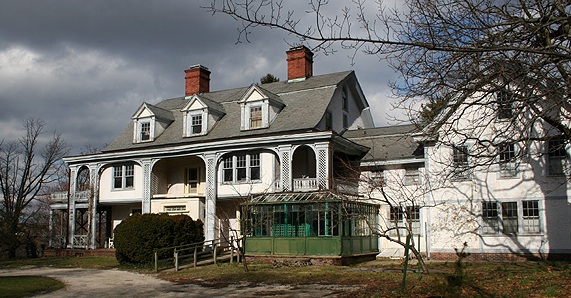
William Cullen Bryant's Estate in Roslyn, Long Island, NY
(Re-use of the picture under the GNU Free Documentation License.)
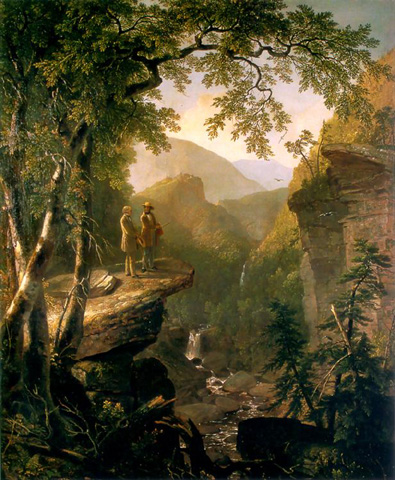
Asher Durand's Kindred Spirits depicts William Cullen Bryant with
Thomas Cole in the quintessentially Hudson River School style.
(This work of art is in the public domain.)
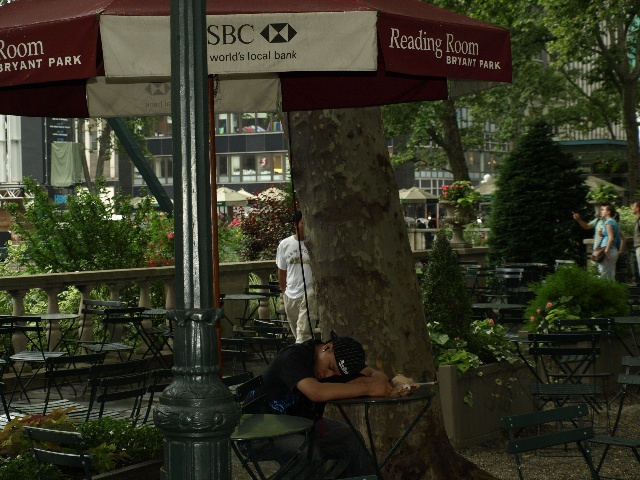
Bryant Park, which is named after William Cullen Bryant, next to the New York Public Library at 42nd Street and Fifth Avenue. 2009.
(Author of the photo: the editor of ourenglish.org. Copyright is released into the public domain.)
**This tiny but significant park is the place for annual book shows, free concerts and free classic movies in summer. When weather permits, you can also find pingpong tables set up for amateur players free. It is a nice place for leisure all year round.**
 
|
|

